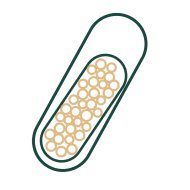
Do you have questions?
Need additional advice? No problem! Ask our team of experts. We'd love to hear from you.
Your cart
Your cart is empty
Continue shoppingYou might also like
Order special instructions
Subscribe to our newsletter and get a 10% discount. Click here and subscribe!
Docosahexaenoic acid (DHA) is an essential omega-3 fatty acid primarily found in fatty fish, such as salmon and sardines, and is important for the brain, eyes, and triglyceride levels. A daily intake of at least 250 mg of DHA is required for these benefits. During pregnancy, DHA contributes to the development of the brain and eyes of the fetus and supports breastfeeding. Fish oil provides a direct source of DHA.

Docosahexaenoic acid, also known as DHA, is an essential omega-3 fatty acid that occurs naturally in fish oil. DHA plays an important role in the structure of cell membranes, especially in the brain and eyes. It is mainly found in oily fish such as salmon, mackerel and sardines.
DHA is good for vision, brain and triglyceride levels. At a minimum intake of 250 mg DHA per day. This emphasizes the importance of sufficient DHA in the diet, as it contributes to the health of several important functions in the body.
Maternal DHA intake contributes to the proper development of the eyes of the foetus and breastfed infants. At a minimum intake of 250 mg DHA per day. In addition, DHA plays an important role in the development of the brain: maternal DHA intake contributes to the development of normal brain function of the foetus and breastfed infants. At a minimum intake of 250 mg DHA per day.
DHA is mainly found in oily fish such as salmon, herring, mackerel and sardines. These fish naturally provide high concentrations of DHA, making them the best dietary source of this omega-3 fatty acid.
Fish oil is one of the most concentrated sources of omega-3, especially DHA. Unlike plant sources like flaxseed, fish oil contains DHA directly. This makes it a more efficient choice for people looking to optimize their omega-3 intake, especially the active form DHA.
Fish oil with DHA is suitable for anyone looking to increase their omega-3 intake, especially those who do not eat oily fish. This also applies to pregnant women who want to support their baby's development and those who want to focus on their brain and eye health.
Yes, DHA can be used during pregnancy. The intake of DHA by the mother contributes to the proper development of the eyes of the foetus and of breastfed infants. With a minimum intake of 250 mg DHA per day. In addition, DHA supports the normal brain development of the foetus and breastfed infants, with a daily intake of at least 250 mg.
Yes, DHA is available in supplement form. For example, it's found in Insentials' Smart Vitamins for Her and for Him. For optimal benefits, it's important to take at least 250 mg of DHA per day. Smart Vitamins for Her and Smart Vitamins for Him contain a whopping 293 mg of DHA.

Need additional advice? No problem! Ask our team of experts. We'd love to hear from you.
+32 475 75 32 52

